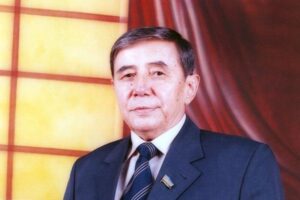SHARE WITH FRIENDS:
of the lesson purpose:
Educational the goal: Information about the life and work of Utkir Hoshimov
Educational the goal: Development of feelings of love for the Motherland
Developer: draw conclusions and develop the skills to substantiate them
of the lesson turi : new educator
of the lesson method: question and answer
of the lesson device: use of textbooks, thematic instructions and handouts; pictures and newspapers.
of the lesson go:
I.Organizational section.
-
a) Greeting students
-
b) review the cleanliness of the classroom, the readiness of students for the lesson
-
c) determine student attendance.
II. Passed subject repetition
-
Who is the author of the poems "Dawn", "About humility", "Spring", "Love"?
-
Which of our poets translated the German poet Goethe's "Faust" into Uzbek?
-
Who is the author of such epics as "Dream Fountain", "Epic Written in a Tent", "Sun Mask"?
-
4. Which of Erkin Vahidov's epics do you know?
-
III. What a new topic:
Utkir Hoshimov was born on August 1941, 5 in the village of Dombirabad in Tashkent to a working-class family. The writer recalls the events of his birth: “My mother used to say one thing: When you were born, the Day of Judgment was imminent. The Russian women in the camp cried that the war had begun, and I - my aunt's calf - was amazed. The war was already going on, and I wondered why they were screaming. Then I came to my senses. "
* Utkir Hoshimov describes his high school years, wartime children and students as follows: “Every generation has its own joys and worries. Anyway, it was a different time when we war kids stepped into school. Did the teachers have a strange dedication?… Dress and behave… At the same time, our teachers did not hesitate to throw firewood on the iron stove while teaching… The children in the class were also different. One was almost a baby, the other's voice was hoarse… Not long after the war ended… »
After graduating from high school, Utkir Hoshimov studied at the Faculty of Philology of Tashkent State University from 1959 to 1964
is studying journalism. The writer worked in the newspapers "Tashkent Haqiqati", "Tashkent Oqshomi", Gafur Gulom publishing house. Since 1985, he has been the editor-in-chief of Sharq Yulduz. He began his career writing poetry and essays. In 1991, he was awarded the People's Writer of Uzbekistan, the Republican State Prize named after Oybek and Hamza.
In the story "World Affairs" depicts the life of our people during the war, the tragic past. Students who read this work will be able to imagine the battle scenes, the courage of the Uzbeks on the battlefields. Naturally, the writer saw with his own eyes the horrors of war, the life of the front. However, his childhood was spent during the war years. Some of the writer’s childhood memories confirm this. The author’s story “The Last Victim of the War” also continues the events of the war period.
The small size of the story reveals an important topic. The story begins with a description of the conditions of the war, the material crisis. The writer does not elaborate in describing this scene. On the contrary, it represents the family’s household items by drawing a picture of the environment. The head of the family, Shoikrom, is the cause of an unbearable tragedy - he becomes the killer of his mother.
In fact, the main reason for this tragedy was the material hardships of the war, the "blackness" of the acquaintance's death, and the condition of Shone'mat, who was on his deathbed. Shoikrom's hard work at the plant, as well as the theft of a cow, the intrusion of a foreign hand on a strawberry that is just beginning to turn color, and other events, confuse the protagonist. It was the cdi that was squeezing him like a drum. He seeks and finds a way out of the crisis. That is, one end throws the wire connected to the sieve current to the strawberry. Suddenly tragedy strikes. At night, his mother, Aunt Umri, enters the strawberry grove with the intention of exchanging strawberries for her sick son Shone'mat to get milk, and dies by clinging to a power cord.
In fact, the condition of the other heroes in the story is no less than that of Shoikrom. Aunt Umri, who is suffering from family worries, "wearing a faded dress" and suffering from the grief of her sick son, and Shone'mat, who has not smiled for weeks, is also in a sad state.
-
Strengthen the new theme
"What would the protagonists be like if there was no war?"
-
Shoikrom would not be left in remorse. He would have breathed freely.
-
Shone'mat would have escaped the clutches of death.
-
Aunt Umri would have enjoyed her children.
-
Khadija's family worries would not have bothered her so much.
-
The "black people" who tormented people would not have come.
"Did you notice the vices of selfishness, self-thinking in Shoikrom's character?"
Students will also answer this question to the best of their ability.
-
The patient does not ask his brother for ten days.
-
He looks for the cause of the troubles in the family from his wife.
-
He doesn't even think I'm guilty.
-
When his mother comes out, he finds out that his wife lied that there was no food left. But he doesn't say, "He wants to warm me up in the morning."
